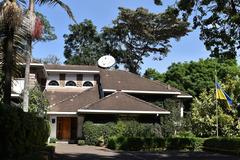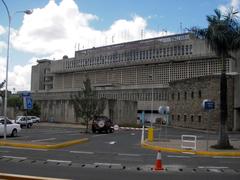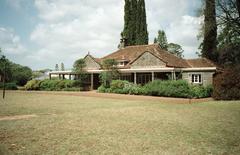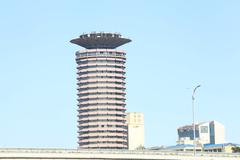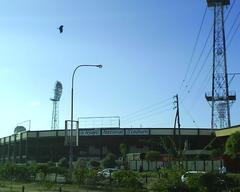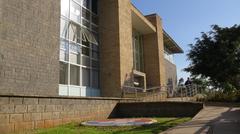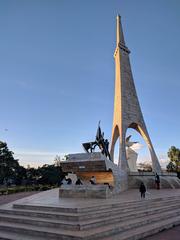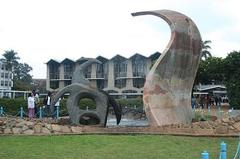Africa Nazarene University Visiting Guide, Nairobi, Kenya: Tickets, Hours, and Tips
Date: 04/07/2025
Introduction
Africa Nazarene University (ANU), nestled on the edge of Nairobi National Park in Kenya, is a distinguished institution that harmoniously blends academic excellence, Christian values, and cultural diversity. Established in the early 1990s by the Church of the Nazarene, ANU has become a transformative hub for ethical leadership and holistic education, rooted in the Wesleyan-Holiness tradition. As the first Nazarene university outside North America and the first private Kenyan university to independently receive a full charter in 2002, ANU welcomes students and visitors from over 20 countries. Its unique location adjacent to the Maasai savannah offers visitors an immersive experience in both education and nature.
This guide provides detailed insights for prospective visitors, students, researchers, and cultural travelers—covering ANU’s history, campus highlights, visiting hours, ticketing, accessibility, travel tips, and nearby attractions. It also features the Africa Nazarene University Monument, a significant landmark commemorating the institution’s enduring legacy in Kenya’s higher education landscape. For the most current details, consult the official ANU website and these resources: Africa Nazarene University History, Go Visit Kenya, and Nairobi News.
Contents
- Introduction
- Founding Vision and Early Development
- Campus Location and Physical Growth
- Academic Milestones and Expansion
- Cultural and Social Significance
- Accreditation and Recognition
- Visiting Africa Nazarene University: Essential Information
- Visiting Hours and Tickets
- Accessibility and Visitor Facilities
- Travel Tips and Nearby Attractions
- Special Events and Photographic Spots
- Africa Nazarene University Monument
- History and Cultural Significance
- Visitor Information
- Accessibility and Amenities
- Nearby Attractions
- Travel Tips
- Practical Visitor Information and Nearby Attractions
- Transportation Options
- Health, Safety, and Practical Tips
- Frequently Asked Questions (FAQs)
- Visuals
- Essential Contacts
- Conclusion and Call to Action
Founding Vision and Early Development
Africa Nazarene University was envisioned in the early 1980s by the Church of the Nazarene to address Africa’s educational and societal challenges. Grounded in the Wesleyan-Holiness tradition, its founders sought to combine academic rigor with Christian ethics and leadership (ANU History; Wikipedia).
The Kenya Universities Act of 1985 enabled faith-based private universities, paving the way for ANU’s establishment. After consultations with the Kenyan Commission for Higher Education, Kenya was chosen as the site for the Church’s first university outside North America (Go Visit Kenya).
ANU was formally approved by the Church’s General Assembly in July 1993, and the Kenyan government issued a Letter of Interim Authority on November 23, 1993, making ANU the first Nazarene university outside North America and the first private Kenyan university to seek a charter under the 1985 Act (The Kenya Times).
Campus Location and Physical Growth
ANU’s main campus spans 124 acres (50.181 hectares) on the Maasai savannah, adjacent to Nairobi National Park, off Magadi Road near Ongata Rongai, approximately 22–24 kilometers from Nairobi’s city center (Wikipedia; ANU History). The campus’s serene environment offers scenic vistas of the Maasai Plains and easy access to Nairobi’s urban centers.
Land acquisition began in 1987, led by missionary Dr. Harmon Schmelzenbach. The Africa Nazarene University Trust, established in 1990, oversees ongoing campus development (Go Visit Kenya). The campus is known for its striking natural beauty and picturesque photographic spots.
Academic Milestones and Expansion
ANU opened in August 1994 with 62 students from eleven African countries, initially offering degrees in Theology, Business Administration, and a Master of Arts in Religion (ANU History; Wikipedia). By 1995, Computer Science was introduced.
Under Vice Chancellor Prof. Leah T. Marangu (1996–2002), ANU expanded its academic portfolio and enrollment. The university earned a full charter on October 8, 2002, becoming the first private university in Kenya to do so independently (ANU History; Wikipedia).
Today, ANU offers 36 programs across five schools: Law, Business, Science & Technology, Humanities & Social Sciences, and Religion & Ministry (ANU Schools). Its digital learning platform reaches students across Africa.
Cultural and Social Significance
ANU’s education is deeply rooted in Christian values, requiring chapel attendance and religious studies to foster spiritual and ethical growth (Nairobi News). The multicultural campus hosts students and alumni from over 20 countries, and the International Students’ Club organizes cross-cultural and charity events (Go Visit Kenya).
Notable alumni include Beatrice Elachi, a Kenyan political leader and ANU graduate in Peace and Security Studies (Olomu Info).
Accreditation and Recognition
ANU is fully accredited by Kenya’s Commission for University Education (CUE) and is a member of the global Church of the Nazarene education system. Since 2002, it has also been part of the Council for Christian Colleges & Universities (Go Visit Kenya; Nairobi News). Graduates are highly respected and sought after within Kenya and internationally.
Visiting Africa Nazarene University: Essential Information
Visiting Hours and Tickets
- Hours: Monday to Friday, 8:00 AM to 5:00 PM. Weekends and public holidays require prior arrangement.
- Admission: General campus visits are free, though special events or guided tours may require advance booking or tickets.
Accessibility and Visitor Facilities
- Campus is wheelchair accessible with paved walkways and ramps.
- Ample parking is available.
- Visitor centers provide maps and information.
- Guided tours are offered upon request through the visitor office.
- Facilities include a cafeteria, restrooms, Wi-Fi in public areas, a bookshop, medical services at the Nellie Montague Clinic, and a chapel for reflection.
Travel Tips and Nearby Attractions
- ANU is approximately 30–45 minutes by car or public transport from Nairobi city center.
- Nearby Attractions:
- Nairobi National Park: Adjacent to ANU; wildlife safaris open 6:00 AM–6:00 PM.
- Giraffe Centre: 15 km away; conservation and giraffe feeding.
- David Sheldrick Wildlife Trust: Elephant orphanage in Lang’ata.
- Karen Blixen Museum: 18 km from ANU; guided tours of the author’s home.
- Oloolua Nature Trail: Forest reserve for walking and picnics.
- Bomas of Kenya: Cultural shows and homesteads.
- The Hub Karen & Galleria Mall: Shopping and dining.
- Ngong Hills: Hiking and scenic vistas, about 24 km away.
Special Events and Photographic Spots
- Annual Research Conference and cultural festivals.
- Chapel services open to visitors.
- Scenic campus vistas, especially over the Maasai Plains and Nairobi National Park, are ideal for photography.
Africa Nazarene University Monument
History and Cultural Significance
The Africa Nazarene University Monument stands within the campus, symbolizing the university’s founding ideals and commitment to faith-based education and community development. It celebrates ANU’s journey from its 1994 inception to its current status as a respected academic institution.
Visitor Information
- Visiting Hours: Monday to Friday, 8:00 AM–5:00 PM; weekends by appointment.
- Admission: Free. Guided tours and event attendance require advance booking via university services.
Accessibility and Amenities
- Easy access by road from Nairobi (20–30 minutes).
- Public transport and ride-hailing services (Uber, Bolt) are available.
- Wheelchair-accessible pathways lead to the monument.
- Amenities include restrooms, shaded seating, and an information center.
Nearby Attractions
Combine your visit with a trip to Nairobi National Park or explore Nairobi’s museums, markets, and restaurants.
Travel Tips
- Visit on weekdays for guided tours.
- Wear comfortable shoes and sun protection.
- Check the ANU website or contact visitor services for event schedules or temporary closures.
Transportation Options
- Private Car: Magadi Road, with on-campus parking.
- Public Transport: Matatus and buses on Nairobi–Ongata Rongai route (alight at Nazarene University stop).
- Taxi/Ride-hailing: Uber and Bolt widely available.
- University Shuttle: By prior arrangement.
Health, Safety, and Practical Tips
- Ensure vaccinations are up to date; yellow fever vaccine may be required.
- Closest emergency hospital: Nairobi Women’s Hospital.
- Carry Kenyan Shilling cash and cards.
- Mobile networks: Safaricom and Airtel.
- Dress modestly out of respect for the university’s values.
- Always request permission for photography.
Frequently Asked Questions (FAQs)
Q: What are Africa Nazarene University’s visiting hours?
A: Monday to Friday, 8:00 AM–5:00 PM. Weekend visits by prior arrangement.
Q: Is there an entry fee to visit ANU?
A: No, campus visits are free. Special events or guided tours may require booking.
Q: Are guided tours available?
A: Yes, arrange group or educational tours in advance with the university.
Q: What nearby attractions can I visit after ANU?
A: Nairobi National Park, Giraffe Centre, David Sheldrick Wildlife Trust, and Karen Blixen Museum.
Q: Are there accommodations near ANU?
A: Options include Osoita Lodge, Karen Blixen Coffee Garden & Cottages, and Wildebeest Eco Camp.
Visuals
- [Insert high-quality images of Africa Nazarene University campus, Nairobi National Park, Giraffe Centre, and Karen Blixen Museum with descriptive alt text.]
Essential Contacts
- Main Campus: Ongata Rongai, off Magadi Road, Nairobi, Kenya
- Phone: +254 703 970 520/5, +254 20 252 7170-5
- Email: [email protected] / [email protected]
- Website: www.anu.ac.ke
Conclusion and Call to Action
Africa Nazarene University distinguishes itself as a center for academic, spiritual, and cultural enrichment, set against the stunning Maasai Plains and Nairobi National Park. Visitors can enjoy vibrant campus life, participate in chapel services, attend academic conferences, and experience the Africa Nazarene University Monument. With its inclusive facilities, secure environment, and proximity to Nairobi’s top attractions, ANU is ideal for students, tourists, and scholars.
For updated visitor information, events, and guided tour bookings, consult the official ANU website and follow the university’s social media channels. Enhance your visit with the Audiala app for real-time updates, exclusive offers, and interactive tours. Embrace the opportunity to explore one of Kenya’s premier educational institutions—where “what begins here transforms the world.”
Sources and Further Reading
- Africa Nazarene University History, 2025, Africa Nazarene University (https://www.anu.ac.ke/about-anu/history/)
- Africa Nazarene University, 2025, Wikipedia (https://en.wikipedia.org/wiki/Africa_Nazarene_University)
- Africa Nazarene University: Visiting Hours, Tickets, and Historical Significance in Nairobi, 2025, Go Visit Kenya (https://www.govisitkenya.com/africa-nazarene-university-kenya.html)
- A Comprehensive Look at Nazarene University Nairobi, 2025, Nairobi News (https://nairobinews.co.ke/a-comprehensive-look-at-nazarene-university-nairobi/)
- Owners of Africa Nazarene University and Why They Chose Kenya, 2025, The Kenya Times (https://thekenyatimes.com/featured/owners-of-africa-nazarene-university-and-why-they-chose-kenya/)
- Beatrice Elachi Biography, 2025, Olomu Info (https://olomu.info/beatrice-elachi-biography/)
